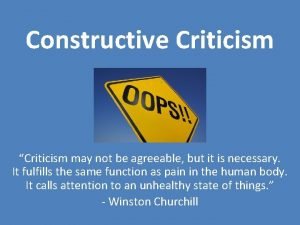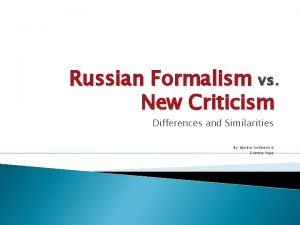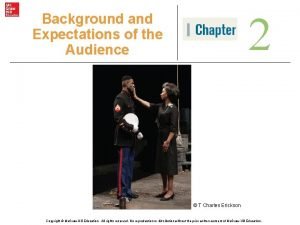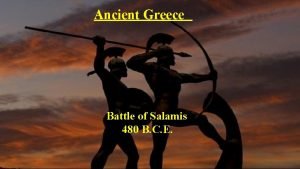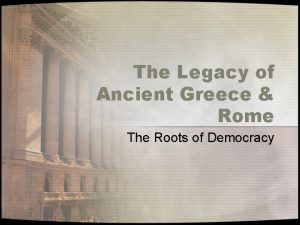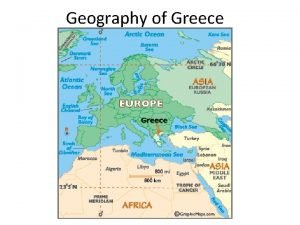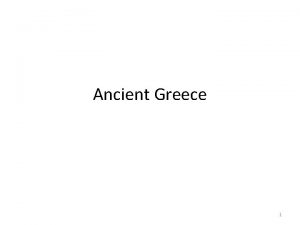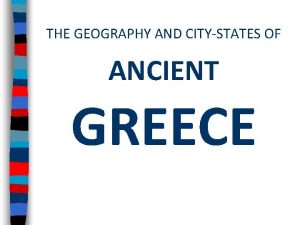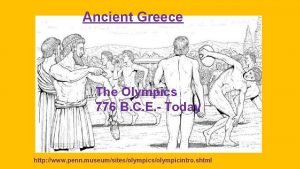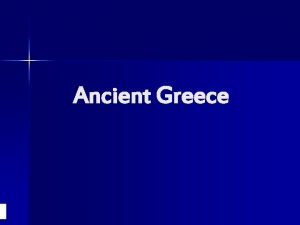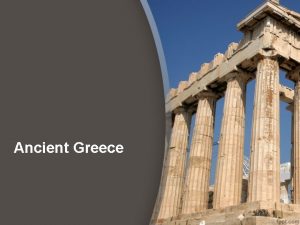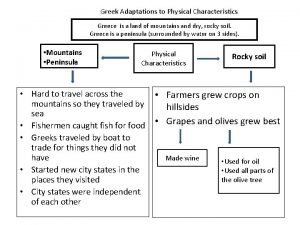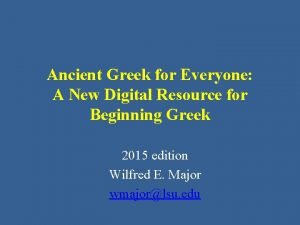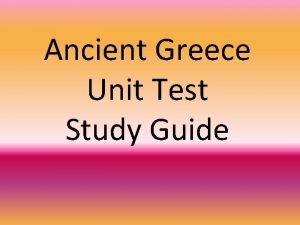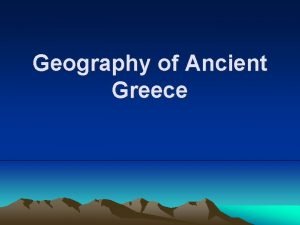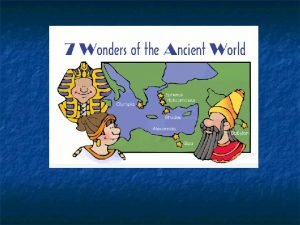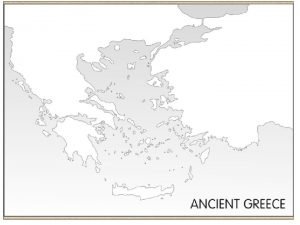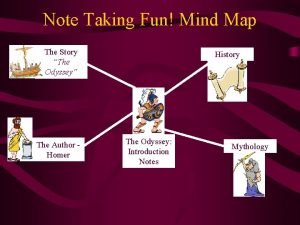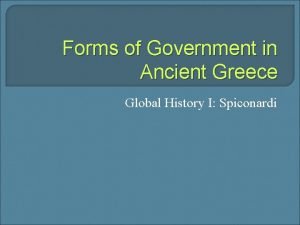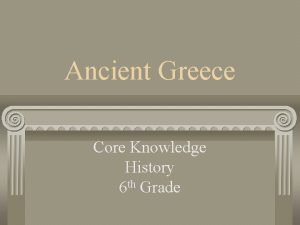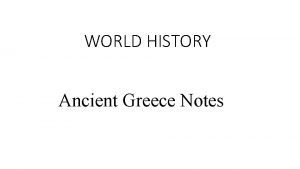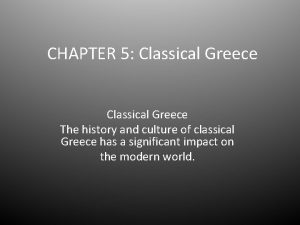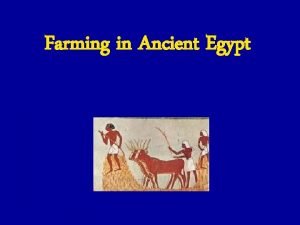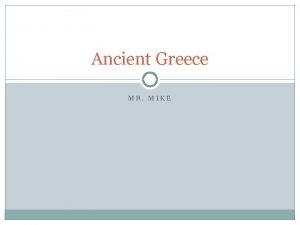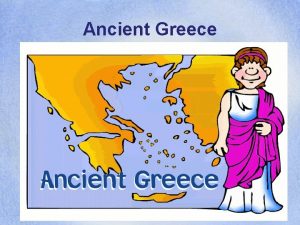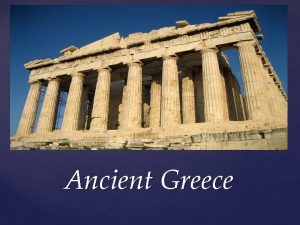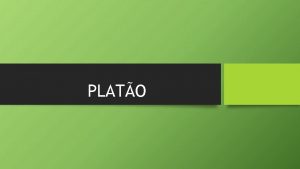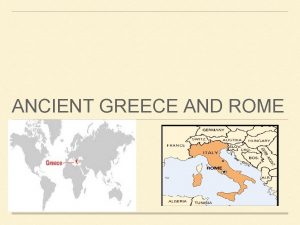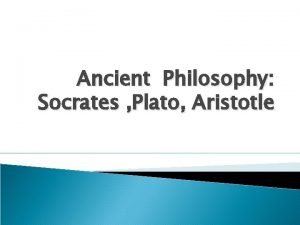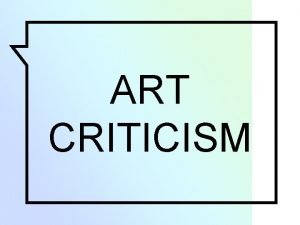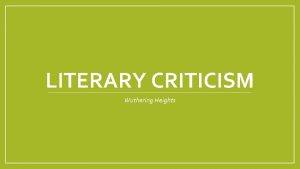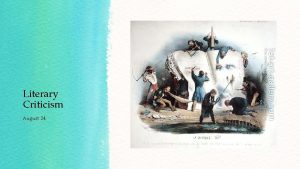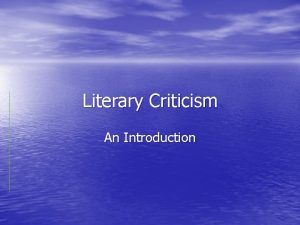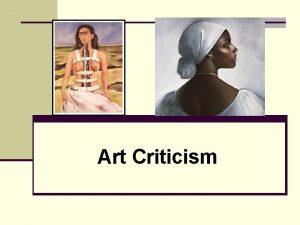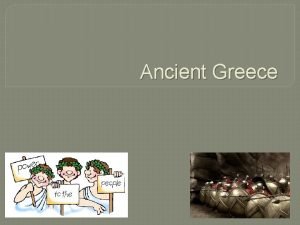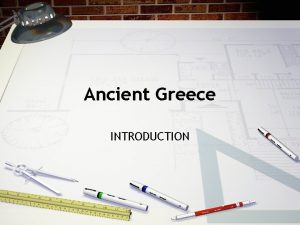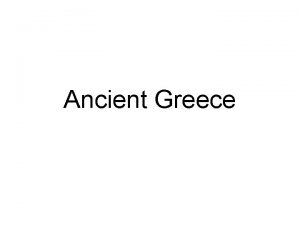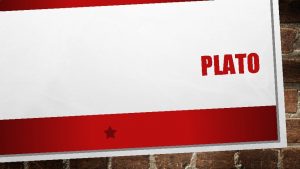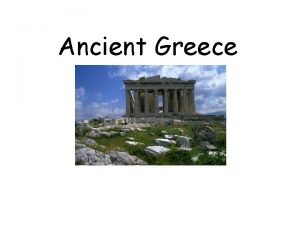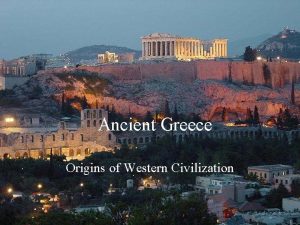Lecture 3 Criticism in Ancient Greece Plato on






























- Slides: 30


Lecture 3 Criticism in Ancient Greece: Plato on Poetry Literary Criticism and Theory ﻋﻤﺎﺩﺓ ﺍﻟﺘﻌﻠﻢ ﺍﻹﻟﻜﺘﺮﻭﻧﻲ ﻭﺍﻟﺘﻌﻠﻴﻢ ﻋﻦ ﺑﻌﺪ Deanship of E-Learning and Distance Education [ ] ﺟﺎﻣﻌﺔ ﺍﻟﻤﻠﻚ ﻓﻴﺼﻞ King Faisal University

Greece and Western Literature v There is no genre of literature that we have today – tragedy, comedy, the different forms of poetry, the short story and even the novel – that the Greeks didn’t develop. v Yes, Western literature is based on Greek literature, but as the previous lecture showed and as we will see in this lecture, the reality is more complex than that. v Greek thought influenced, in one way or another, every single literary form that developed in Europe and the West, but the differences between the two cultures remain significant. v This lecture and the next will look at the two influential Greek thinkers who influenced the development of Western literature and criticism more than any other thinker in history: Plato and Aristotle. ﻋﻤﺎﺩﺓ ﺍﻟﺘﻌﻠﻢ ﺍﻹﻟﻜﺘﺮﻭﻧﻲ ﻭﺍﻟﺘﻌﻠﻴﻢ ﻋﻦ ﺑﻌﺪ Deanship of E-Learning and Distance Education [ 3 ] ﺟﺎﻣﻌﺔ ﺍﻟﻤﻠﻚ ﻓﻴﺼﻞ King Faisal University

Plato’s Critique of Poetry Extremely influential and extremely misunderstood. v He wrote dialogues and in every single one, he addressed poetry. He was v obsessed with poetry throughout his life. But to the present, Western literature and criticism cannot agree why Plato was so obsessed with poetry? Some critics love him, some hate him, but they all respect him. Plato’s most important contributions to criticism appear in his famous v dialogue the Republic. Two main ideas appear in this dialogue that have had a lasting influence. The following lecture will present those ideas and then provide some analysis. Our interest is in Book III and Book X of the Republic. Two ideas emerge in v these two books that have had a lasting influence: ﻋﻤﺎﺩﺓ ﺍﻟﺘﻌﻠﻢ ﺍﻹﻟﻜﺘﺮﻭﻧﻲ ﻭﺍﻟﺘﻌﻠﻴﻢ ﻋﻦ ﺑﻌﺪ Deanship of E-Learning and Distance Education [ 4 ] ﺟﺎﻣﻌﺔ ﺍﻟﻤﻠﻚ ﻓﻴﺼﻞ King Faisal University

Book III of the Republic v Plato makes the very important distinction between Mimesis and Diagesis, two concepts that remain very important to analyse literature even today. They are often translated as imitation and narration or showing and telling: v If I tell you the story of Napoleon’s invasion of Egypt in the third person: He sailed to Alexandria with 30 000 soldiers and then he marched on Cairo, etc. ” That would be a narration (diagesis). I am telling you the story. v But if I tell you the story in the first person, as if I am Napoleon: “I sailed to Alexandria with 30 000 soldiers, and then I marched on Cairo, etc. ” That would be an imitation (mimesis). I am showing you the story. v Drama with characters is usually a mimesis; stories in the third person are usually a diegesis. ﻋﻤﺎﺩﺓ ﺍﻟﺘﻌﻠﻢ ﺍﻹﻟﻜﺘﺮﻭﻧﻲ ﻭﺍﻟﺘﻌﻠﻴﻢ ﻋﻦ ﺑﻌﺪ Deanship of E-Learning and Distance Education [ 5 ] ﺟﺎﻣﻌﺔ ﺍﻟﻤﻠﻚ ﻓﻴﺼﻞ King Faisal University

“But when the poet speaks in the person of another, may we not say that he assimilates his style to that of the person who, as he informs you, is going to speak? Certainly And this assimilation of himself to another, either by the use of voice or gesture, is the imitation (mimesis) of the person whose character he assumes? Of course Then in that case the narrative of the poet may be said to proceed by way of imitation? Very true Plato, Republic 393. ﻋﻤﺎﺩﺓ ﺍﻟﺘﻌﻠﻢ ﺍﻹﻟﻜﺘﺮﻭﻧﻲ ﻭﺍﻟﺘﻌﻠﻴﻢ ﻋﻦ ﺑﻌﺪ Deanship of E-Learning and Distance Education [ 6 ] ﺟﺎﻣﻌﺔ ﺍﻟﻤﻠﻚ ﻓﻴﺼﻞ King Faisal University

Mimesis-Diegesis (imitation-narration) Plato was the first to explain that narration or story telling (in Arabic al-sard) can proceed by narration or by imitation: “And narration may be either simple narration, or imitation, or a union of the two” (Republic, 392). This distinction has been very popular in Western literary criticism and it remains today very important for the analysis of literature. We will see in future lectures how useful it is to twentieth century schools of criticism like Formalism and Structuralism. ﻋﻤﺎﺩﺓ ﺍﻟﺘﻌﻠﻢ ﺍﻹﻟﻜﺘﺮﻭﻧﻲ ﻭﺍﻟﺘﻌﻠﻴﻢ ﻋﻦ ﺑﻌﺪ Deanship of E-Learning and Distance Education [ 7 ] ﺟﺎﻣﻌﺔ ﺍﻟﻤﻠﻚ ﻓﻴﺼﻞ King Faisal University

Book X of the Republic v Plato introduced another idea that has produced strong reactions in Western literature and criticism and has been very difficult to understand. v This is Plato’s famous decision in Book X of the Republic to ban poets and poetry from the city. v Because European and Western cultures have always valued poetry, literature and art, Plato’s decision has always been difficult to explain. Western cultures have always claimed that their practice of literature and art are based on Greek antiquity, but here is the most important Greek philosopher rejecting art and poetry and banning them from his ideal city. ﻋﻤﺎﺩﺓ ﺍﻟﺘﻌﻠﻢ ﺍﻹﻟﻜﺘﺮﻭﻧﻲ ﻭﺍﻟﺘﻌﻠﻴﻢ ﻋﻦ ﺑﻌﺪ Deanship of E-Learning and Distance Education [ 8 ] ﺟﺎﻣﻌﺔ ﺍﻟﻤﻠﻚ ﻓﻴﺼﻞ King Faisal University

Plato Bans the Poet Christopher Janaway sums up Western Reactions to Plato’s Ban of Poetry: “They protest too much: Plato is assailed with ‘gross illogicality and unfairness’, ‘passionate, hopelessly bad arguments’, ‘trivial or sophistic arguments which he cannot himself regard as conclusive’, and a position which is ‘quite unacceptable’ (how dare he!) – but then again it is said that he is only ‘enjoying himself by over -stating his case’, that a ‘comparison with other dialogues makes it quite clear that [these sections of the Republic] do not contain his considered opinion’, and that we should ‘construct a nobler and more generous theory of Aesthetic Arts’ on his behalf. Perhaps there is a hidden ‘commendation of good art’ even within Book 10 itself, or is Plato ‘struggling after a theory of aesthetics which does not find full expression before Hegel’? ” Christopher Janaway, Images of Excellence: Plato's Critique of the Arts, (Clarendon Press, Oxford, 1995), p. 154, n. 46. ﻋﻤﺎﺩﺓ ﺍﻟﺘﻌﻠﻢ ﺍﻹﻟﻜﺘﺮﻭﻧﻲ ﻭﺍﻟﺘﻌﻠﻴﻢ ﻋﻦ ﺑﻌﺪ Deanship of E-Learning and Distance Education [ 9 ] ﺟﺎﻣﻌﺔ ﺍﻟﻤﻠﻚ ﻓﻴﺼﻞ King Faisal University

Some have even written imaginary dialogues with Plato to explain to him the gravity of his decision and teach him how good the Western concept of art is: “We may be tempted to imagine teaching Plato this concept of ours, and patiently leading him out of error: ‘You see, these things that you are attacking are Art. If something is Art it invariably has the following value…and does not really need any further justification. ’ (‘Thank you for clearing that up’, he might reply -…)” Ibid. ﻋﻤﺎﺩﺓ ﺍﻟﺘﻌﻠﻢ ﺍﻹﻟﻜﺘﺮﻭﻧﻲ ﻭﺍﻟﺘﻌﻠﻴﻢ ﻋﻦ ﺑﻌﺪ Deanship of E-Learning and Distance Education [ 10 ] ﺟﺎﻣﻌﺔ ﺍﻟﻤﻠﻚ ﻓﻴﺼﻞ King Faisal University

Oral Society v Only in the 20 th century that some scholars finally showed that the poetry that Plato talks about and bans is different from the poetry and art that Europe and the West have. v Paul Kristller drew attention to the fact that the Greeks did not have anything similar to the Western ideas of art and literature. The Western ideas of art and literature did not exist in ancient Greece and Rome: “The Greek term for Art and its Latin equivalent (ars) do not specifically denote the “fine arts” in the modern sense, but were applied to all kinds of human activities which we would call crafts or sciences. ” Paul Kristller, “The Modern System of the Arts, ” in Journal of the History of Ideas, vols. XII-XIII, (1951 and 1952), p. 498. ﻋﻤﺎﺩﺓ ﺍﻟﺘﻌﻠﻢ ﺍﻹﻟﻜﺘﺮﻭﻧﻲ ﻭﺍﻟﺘﻌﻠﻴﻢ ﻋﻦ ﺑﻌﺪ Deanship of E-Learning and Distance Education [ 11 ] ﺟﺎﻣﻌﺔ ﺍﻟﻤﻠﻚ ﻓﻴﺼﻞ King Faisal University

v A decade later Eric Havelock confirmed the same point: “Neither “art” nor “artist”, as we use the words, is translatable into archaic or high-classical Greek. ” Eric Havelock, Preface to Plato, (p. 33, n. 37. ) v The Western institution of “Fine Arts” or “les Beaux Arts” or Aesthetics”, as a system that includes on the basis of common characteristics those human activities [painting, architecture, sculpture, music and poetry] and separates them from the crafts and the sciences, are all products of the mid eighteenth century: ﻋﻤﺎﺩﺓ ﺍﻟﺘﻌﻠﻢ ﺍﻹﻟﻜﺘﺮﻭﻧﻲ ﻭﺍﻟﺘﻌﻠﻴﻢ ﻋﻦ ﺑﻌﺪ Deanship of E-Learning and Distance Education [ 12 ] ﺟﺎﻣﻌﺔ ﺍﻟﻤﻠﻚ ﻓﻴﺼﻞ King Faisal University

Arts is an 18 th Century Invention “The basic notion that the five “major arts” [painting, sculpture, architecture, music and poetry] constitute an area all by themselves, clearly separated by common characteristics from the crafts and the sciences and other human activities, has been taken for granted by most writers on aesthetics from Kant to the present day. It is freely employed even by those critics of art and literature who profess not to believe in “aesthetics”; and it is accepted as a matter of course by the general public of amateurs who assign to “Art” with a capital A that ever narrowing area of modern life which is not occupied by science, religion, or practical pursuit. ” Paul Kristeller, “The Modern System of the Arts, ” (p. 498. ) ﻋﻤﺎﺩﺓ ﺍﻟﺘﻌﻠﻢ ﺍﻹﻟﻜﺘﺮﻭﻧﻲ ﻭﺍﻟﺘﻌﻠﻴﻢ ﻋﻦ ﺑﻌﺪ Deanship of E-Learning and Distance Education [ 13 ] ﺟﺎﻣﻌﺔ ﺍﻟﻤﻠﻚ ﻓﻴﺼﻞ King Faisal University

So what kind of poetry did the Greeks have? Why did Plato ban it? Notice, first, that Plato does not use the words “literature” or “art. ” He uses the word “poetry. ” The discipline that we call today Literature is an 18 th century European invention. In the ancient world, they had poetry, tragedy and comedy, but they were all known as “poetry. ” They poet could be a tragedian like Sophocles or Euripides, a comedian like Aristophanes, or an epic poet like Homer, but the Greeks never called any of these poets “artists” and they never called their poems and plays, “literature. ” ﻋﻤﺎﺩﺓ ﺍﻟﺘﻌﻠﻢ ﺍﻹﻟﻜﺘﺮﻭﻧﻲ ﻭﺍﻟﺘﻌﻠﻴﻢ ﻋﻦ ﺑﻌﺪ Deanship of E-Learning and Distance Education [ 14 ] ﺟﺎﻣﻌﺔ ﺍﻟﻤﻠﻚ ﻓﻴﺼﻞ King Faisal University

v The poet that Plato describes in the Republic, as Eric Havelock shows, is a poet, a performer and an educator. The poetry that Plato talks about was main source of knowledge in the society. v It is only in an oral society that poetry becomes the most principal source of knowledge and education. v The reason: in a society that does not have a system of writing, poetry becomes useful to record and preserve knowledge. v Without a system of writing, how does a society preserve its knowledge, its customs and its traditions? How does this society transmit that knowledge, custom and tradition to the younger generation? ﻋﻤﺎﺩﺓ ﺍﻟﺘﻌﻠﻢ ﺍﻹﻟﻜﺘﺮﻭﻧﻲ ﻭﺍﻟﺘﻌﻠﻴﻢ ﻋﻦ ﺑﻌﺪ Deanship of E-Learning and Distance Education [ 15 ] ﺟﺎﻣﻌﺔ ﺍﻟﻤﻠﻚ ﻓﻴﺼﻞ King Faisal University

The answer is: Poetry! Because poetry uses rhyme, meter and harmony and those make language easy to remember (like proverbs are easy to remember) Oral societies, societies that do not have a system of writing, use poetry like modern societies use schools, libraries, newspapers and television. Poetry is the education institution. Poetry is the storehouse of knowledge, customs and traditions. Poetry is the medium of communication. ﻋﻤﺎﺩﺓ ﺍﻟﺘﻌﻠﻢ ﺍﻹﻟﻜﺘﺮﻭﻧﻲ ﻭﺍﻟﺘﻌﻠﻴﻢ ﻋﻦ ﺑﻌﺪ Deanship of E-Learning and Distance Education [ 16 ] ﺟﺎﻣﻌﺔ ﺍﻟﻤﻠﻚ ﻓﻴﺼﻞ King Faisal University

Oral Vs. Written Cultures This poetry is vastly different that the Western institution of literature and art • • • Literature is an interaction between a reader and a book Oral poetry is a communal performance. Literature is entertainment and pleasure Oral poetry teaches science, medicine, war and peace and social values The writer or artist of literature is a gifted individual The poet in an oral society is a leader, an educator, a warrior, a priest These distinctions are important to understand why Plato saw the poet as a big danger to his society. ﻋﻤﺎﺩﺓ ﺍﻟﺘﻌﻠﻢ ﺍﻹﻟﻜﺘﺮﻭﻧﻲ ﻭﺍﻟﺘﻌﻠﻴﻢ ﻋﻦ ﺑﻌﺪ Deanship of E-Learning and Distance Education [ 17 ] ﺟﺎﻣﻌﺔ ﺍﻟﻤﻠﻚ ﻓﻴﺼﻞ King Faisal University

Poetry Cripples the Mind v Plato accuses the poetic experience of his time of conditioning the citizens to imitate and repeat, uncritically, the values of a tradition without grasping it. v The citizens, Plato says, are trained to imitate passively the already poor imitations provided by the discourse of poetry. v The poet is only good at song-making. His knowledge of the things he sings about like courage, honour, war, peace, government, education, etc. , is superficial. He only knows enough about them to make his song. v The poet produces only a poor copy of the things he sings about, and those who listen to him and believe him acquire a poor education. v Poetry excites the senses and neutralizes the brain and the thinking faculties. It produces docile and passive imitators. ﻋﻤﺎﺩﺓ ﺍﻟﺘﻌﻠﻢ ﺍﻹﻟﻜﺘﺮﻭﻧﻲ ﻭﺍﻟﺘﻌﻠﻴﻢ ﻋﻦ ﺑﻌﺪ Deanship of E-Learning and Distance Education [ 18 ] ﺟﺎﻣﻌﺔ ﺍﻟﻤﻠﻚ ﻓﻴﺼﻞ King Faisal University

v The first two Books of the Republic describe an unhealthy Greek society where "all men believe in their hearts that injustice is far more profitable than justice" (Republic, 360). Virtue and justice are considered painful and unrewarding. Vice and injustice, however, are not only easy and practical but also rewarding. v Plato blames the traditional education given to the youth. It does not meet the standards of justice and virtue. Then he blames the parents and teachers as accomplices. If parents and tutors tell their children to be just, it is "for the sake of character and reputation, in the hope of obtaining for him who is reputed just some of those offices, marriages and the like" (Republic, 363). v People are encourage to 'seem' just rather than 'be' just. And the authorities to whom people appeal for these views are, of course, the poets. Homer, Masaeus and Orpheus are all cited for illustration. See Republic (363 a-d; 364 c-365 a; 365 e-366 b). ﻋﻤﺎﺩﺓ ﺍﻟﺘﻌﻠﻢ ﺍﻹﻟﻜﺘﺮﻭﻧﻲ ﻭﺍﻟﺘﻌﻠﻴﻢ ﻋﻦ ﺑﻌﺪ Deanship of E-Learning and Distance Education [ 19 ] ﺟﺎﻣﻌﺔ ﺍﻟﻤﻠﻚ ﻓﻴﺼﻞ King Faisal University

v It would be fine, he says, if people just laughed at these tales and stories, but the problem is that they take them seriously as a source of education and law. v How are people’s minds going to be affected, he asks, by the poetic discourse to which they are exposed night and day, in private and in public, in weddings and funerals, in war and in peace? v What is the impact especially on those who are young, “quick-witted, and, like bees on the wing, light on every flower? ” v How are they going to deal with this dubious educational material poured into their minds? They are “prone to draw conclusions, " he says (Republic, 365). ﻋﻤﺎﺩﺓ ﺍﻟﺘﻌﻠﻢ ﺍﻹﻟﻜﺘﺮﻭﻧﻲ ﻭﺍﻟﺘﻌﻠﻴﻢ ﻋﻦ ﺑﻌﺪ Deanship of E-Learning and Distance Education [ 20 ] ﺟﺎﻣﻌﺔ ﺍﻟﻤﻠﻚ ﻓﻴﺼﻞ King Faisal University

The Colors of Poetry: Rhythm, Harmony and Measures Plato analyses two aspects of poetry to prove his point: style and content. Style: Plato observes that the charm of poetry and its power reside in its rhythm, harmony, and measures. These are what he calls the ‘colours’ of poetry. Without them, he says, poetry loses most of its charm and appeal. The poet, he says, is merely good at the aesthetic adjustment of his verses and rhythms and is actually ignorant about the content of his songs or tales. He is a good craftsman in terms of spinning the appropriate rhythms and melodies to achieve the desired effect on the listener, but as far as the actual matters he sings about, like war or peace or justice or good or evil, he knows no more about them than his ignorant audience. The poet’s craft, Plato says, demands only a superficial knowledge of things; just enough to be able to give an imitation of them: ﻋﻤﺎﺩﺓ ﺍﻟﺘﻌﻠﻢ ﺍﻹﻟﻜﺘﺮﻭﻧﻲ ﻭﺍﻟﺘﻌﻠﻴﻢ ﻋﻦ ﺑﻌﺪ Deanship of E-Learning and Distance Education [ 21 ] ﺟﺎﻣﻌﺔ ﺍﻟﻤﻠﻚ ﻓﻴﺼﻞ King Faisal University

“The poet with his words and phrases may be said to lay on the colours of the several arts, himself understanding their nature only enough to imitate them; and other people, who are as ignorant as he is, and judge only from his words, imagine that if he speaks of cobbling, or of military tactics, or of anything else, in meter and harmony and rhythm, he speaks very well - such is the sweet influence which melody and rhythm by nature have. And I think that you might have observed again and again what a poor appearance the tales of poets make when stripped of the colours which music puts upon them, and recited in simple prose. ” Republic, (601 a); See also Gorgias, (502). ﻋﻤﺎﺩﺓ ﺍﻟﺘﻌﻠﻢ ﺍﻹﻟﻜﺘﺮﻭﻧﻲ ﻭﺍﻟﺘﻌﻠﻴﻢ ﻋﻦ ﺑﻌﺪ Deanship of E-Learning and Distance Education [ 22 ] ﺟﺎﻣﻌﺔ ﺍﻟﻤﻠﻚ ﻓﻴﺼﻞ King Faisal University

v Form in oral poetry is not only verbal it is also physical. The oral poet relies equally on gestures, movements and mimicry. These, too, can have a powerful impact on an audience. Like the poet’s words, they divert attention from what is actually being said and only aim to impress the spectator by the skills of the delivery: “[A]nd he will be ready to imitate anything, not as a joke, but in right good earnest, and before a large company. As I was just now saying, he will attempt to represent the roll of thunder, the noise of wind and hail, or the creaking of wheels, and pulleys, and the various sounds of the flutes; pipes, trumpets, and all sorts of instruments: he will bark like a dog, bleat like a sheep, or crow like a cock; his entire art will consist in imitation of voice and gesture, and there will be very little narration. ” Republic, (397 a). Subsequent references will be given in the text. . ﻋﻤﺎﺩﺓ ﺍﻟﺘﻌﻠﻢ ﺍﻹﻟﻜﺘﺮﻭﻧﻲ ﻭﺍﻟﺘﻌﻠﻴﻢ ﻋﻦ ﺑﻌﺪ Deanship of E-Learning and Distance Education [ 23 ] ﺟﺎﻣﻌﺔ ﺍﻟﻤﻠﻚ ﻓﻴﺼﻞ King Faisal University

v Exposing the youth to poetry from childhood to adult age, Plato says, is simply indoctrination and propaganda. The youth will be educated to rely on emotions rather than reason. Poetry cripples the mind. It weakens the critical faculty and breeds conformity. “Did you never observe, " he asks, "how imitation, beginning in early youth and continuing far into life, at length grows into habits and becomes a second nature, affecting body, voice and mind? ” v The mixture of rhymes, rhythms and colourful images can have a strong and powerful impact on the listener, because rhythm and harmony, " he says, "find their way into the inward places of the soul, on which they mightily fasten (Republic, 401). ﻋﻤﺎﺩﺓ ﺍﻟﺘﻌﻠﻢ ﺍﻹﻟﻜﺘﺮﻭﻧﻲ ﻭﺍﻟﺘﻌﻠﻴﻢ ﻋﻦ ﺑﻌﺪ Deanship of E-Learning and Distance Education [ 24 ] ﺟﺎﻣﻌﺔ ﺍﻟﻤﻠﻚ ﻓﻴﺼﻞ King Faisal University

v Excitement of physical pleasures and internal passions, according to Plato, produce a neutralisation of the faculty of sense and judgement. v Plato’s merit is that he distanced himself enough from these experiences to understand that the passivity effect produced was calculated. v The passivity of the spectator/listener is a desired effect produced by a calculation of the components of the poetic medium. v To be sure it is not only the naïve or the ignorant that succumb to the power of poetry. The strength of this tradition and its strong grip on minds is emphasised by Plato when he says “the best of us” are vulnerable to a good passage of Homer or the tragedians: ﻋﻤﺎﺩﺓ ﺍﻟﺘﻌﻠﻢ ﺍﻹﻟﻜﺘﺮﻭﻧﻲ ﻭﺍﻟﺘﻌﻠﻴﻢ ﻋﻦ ﺑﻌﺪ Deanship of E-Learning and Distance Education [ 25 ] ﺟﺎﻣﻌﺔ ﺍﻟﻤﻠﻚ ﻓﻴﺼﻞ King Faisal University

“Hear and judge: The best of us, as I conceive, when we listen to a passage of Homer, or one of the tragedians, in which he represents some pitiful hero who is drawling out his sorrows in a long oration, or weeping, and smiting his breast – the best of us, you know, delight in giving way to sympathy, and are in raptures at the excellence of the poet who stirs our feelings most. Yes, of course I know” (Republic, 605). ﻋﻤﺎﺩﺓ ﺍﻟﺘﻌﻠﻢ ﺍﻹﻟﻜﺘﺮﻭﻧﻲ ﻭﺍﻟﺘﻌﻠﻴﻢ ﻋﻦ ﺑﻌﺪ Deanship of E-Learning and Distance Education [ 26 ] ﺟﺎﻣﻌﺔ ﺍﻟﻤﻠﻚ ﻓﻴﺼﻞ King Faisal University

Seeming Vs. Being v Poetry creates a culture of superficiality. People want only to “seem” just rather than “be” just. v This culture of appearances can be most devastating in politics and law, for it is there that material rewards and economic exploitation are great. v Fake appearances can be of great use to politicians. They could develop, on its basis, superficial ideologies with the sole aim of control and profit. The poets and the rhetoricians are recognized as spin doctors who would ensure that people consent to being deceived or exploited. If that is not enough then there is always the option of force and coercion: ﻋﻤﺎﺩﺓ ﺍﻟﺘﻌﻠﻢ ﺍﻹﻟﻜﺘﺮﻭﻧﻲ ﻭﺍﻟﺘﻌﻠﻴﻢ ﻋﻦ ﺑﻌﺪ Deanship of E-Learning and Distance Education [ 27 ] ﺟﺎﻣﻌﺔ ﺍﻟﻤﻠﻚ ﻓﻴﺼﻞ King Faisal University

“Nevertheless, the argument indicates this, if we would be happy, to be the path along which we should proceed. With a view to concealment we will establish secret brotherhoods and political clubs. And there are professors of rhetoric who teach the art of persuading courts and assemblies; and so, partly by persuasion and partly by force, I shall make unlawful gains and not be punished. ” (Republic, 365) v The superficial culture that poetry produces is not, therefore, equally harmful to everybody. There are those who suffer it and there are those who use and benefit from it. v The benefits are an incentive for many to devote themselves to the game of breeding and developing appearances and lies. Only a cover is needed: “a picture and shadow of virtue to be the vestibule and exterior of my house. ” ﻋﻤﺎﺩﺓ ﺍﻟﺘﻌﻠﻢ ﺍﻹﻟﻜﺘﺮﻭﻧﻲ ﻭﺍﻟﺘﻌﻠﻴﻢ ﻋﻦ ﺑﻌﺪ Deanship of E-Learning and Distance Education [ 28 ] ﺟﺎﻣﻌﺔ ﺍﻟﻤﻠﻚ ﻓﻴﺼﻞ King Faisal University

Conclusion v It seems obvious that, for Plato, it was a deplorable fact that such an experience, or communion, constituted the official form of cultural organization on which the destiny of a whole people for generations depended. It was obvious to him that the Greeks’ reliance on such sensational emotionalism as a source of law, education and morality was a very unhealthy state of affairs, and a recipe for disaster. v Take a step away from it, he suggested to his people, and you will realize how poor and fake an experience it is. You will realize, he says, that it is a blind imitation of modes and patterns of being with no recourse to even the most basic sense of evaluation and judgment. ﻋﻤﺎﺩﺓ ﺍﻟﺘﻌﻠﻢ ﺍﻹﻟﻜﺘﺮﻭﻧﻲ ﻭﺍﻟﺘﻌﻠﻴﻢ ﻋﻦ ﺑﻌﺪ Deanship of E-Learning and Distance Education [ 29 ] ﺟﺎﻣﻌﺔ ﺍﻟﻤﻠﻚ ﻓﻴﺼﻞ King Faisal University

 The difference between criticism and constructive criticism
The difference between criticism and constructive criticism Versus criticism
Versus criticism Descriptive criticism vs prescriptive criticism
Descriptive criticism vs prescriptive criticism Historical criticism definition
Historical criticism definition 01:640:244 lecture notes - lecture 15: plat, idah, farad
01:640:244 lecture notes - lecture 15: plat, idah, farad Salamis 480 bc
Salamis 480 bc The legacy of ancient greece and rome
The legacy of ancient greece and rome Ancient greece map balkan peninsula
Ancient greece map balkan peninsula Where is greece located
Where is greece located Geography of greece
Geography of greece 776bce
776bce Is greece a peninsula
Is greece a peninsula Balkan peninsula in ancient greece
Balkan peninsula in ancient greece Greek people physical characteristics
Greek people physical characteristics Ancient greece webquest
Ancient greece webquest Ancient greece
Ancient greece Ancient greece unit test
Ancient greece unit test Ancient greece map
Ancient greece map 7 wonders of ancient greece
7 wonders of ancient greece Greece travel brochure project
Greece travel brochure project Locate greece
Locate greece Ancient greece continent
Ancient greece continent Ancient greece mind map
Ancient greece mind map Legacies of ancient greece
Legacies of ancient greece Oligarchy definition world history
Oligarchy definition world history Explain the physical education in sparta
Explain the physical education in sparta Core knowledge ancient greece
Core knowledge ancient greece Mycenae ancient greece map
Mycenae ancient greece map Chapter 5 ancient greece
Chapter 5 ancient greece How did greek nobles gain power
How did greek nobles gain power What crops did egypt grow
What crops did egypt grow
